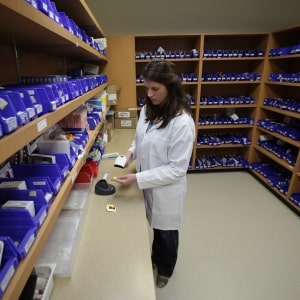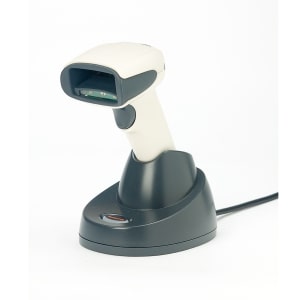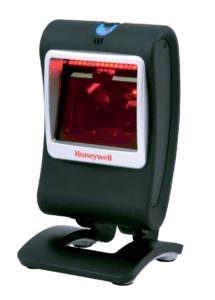
Choosing the Right Prescription Scanner
The team at RMS Omega helps healthcare facilities select, manage and support the appropriate data collection, tracking, and labeling technologies for each department’s needs for accurate patient identification, and safety compliance.
When it comes to barcode scanning, there are many scanners specifically designed for healthcare environments. Most healthcare devices are made with healthcare plastics that are designed to be frequently cleaned with disinfectants. But there are so many applications for scanners in healthcare. Different scanners are better for certain applications. How do you know which is the best prescription scanner for your pharmacy?
In hospital pharmacies, all medications are labeled with barcodes to ensure patient safety. Medication packaged in bulk comes with a barcode label that needs to be scanned so the pharmacist can divide it into individual bottles or packs that will then be labeled. Pharmacists also need to scan barcode labels on the prescriptions to verify that it is going to the right patient. When choosing a prescription scanner, you’ll need to make sure you choose a device that is reliable and can connect in real-time to accurately verify prescriptions when needed.
Hands-free Prescription Scanner
When working in the pharmacy, it may be easiest for pharmacists to use a hands-free prescription scanner. An ideal hands-free device provides an area-imaging scanner engineered to decode all standard 1D, PDF, and 2D barcodes. It is motion tolerant so it reads barcodes when they pass the scan window.
Standing Prescription Scanner
One of Honeywell’s wireless area-imaging prescription scanners can also be used in hospital pharmacies. A healthcare scanner with a small footprint is perfect for the pharmacy. It does not use laser-based scanning, so it requires virtually no training. With their base accessory, these scanners can stand alone to charge while still having all of their scanning capabilities ready to use.

Pocket Prescription Scanner
A pocket scanner can also act as a good prescription scanner. It provides mobility for all healthcare applications. Wherever a prescription travels throughout the hospital, it can be accurately scanned with ease. These scanners are so compact they can be stored securely in a small pocket, on a belt loop, or along the arm so the operator can have use of both hands.
Improve Pharmacy Operations
Prescription scanners are not the only piece of technology needed to improve overall pharmacy operations, although they are a major part of the solution. Having a good printer is also essential to the total pharmacy solution.
A small desktop printer designed for the healthcare environment is perfect in a hospital pharmacy. It is the smart choice for light-duty labeling where users need a reliable, easy-to-use printing solution.
